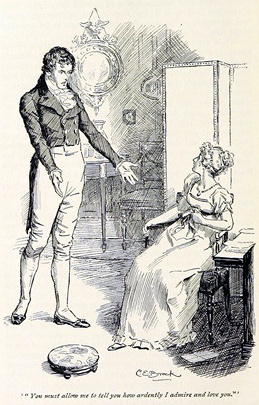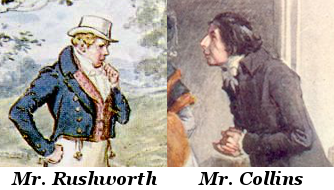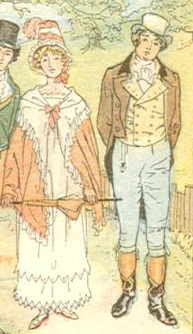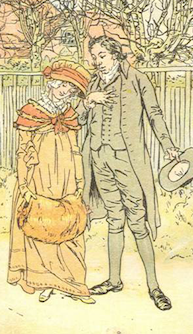Mary Crawford is a controversial figure in Mansfield Park. Many have compared her to Elizabeth Bennet from Pride and Prejudice. The two characters are similar in their liveliness, their wit, and their playfulness — all in contrast to the heroine of Mansfield Park, who is quiet, reserved, and even solemn. Why, some have asked, is Mary condemned for possessing the same qualities as Elizabeth?
The answer is, she isn’t. Mary isn’t judged for her liveliness, her wit, her playfulness, or her charm — she is judged for her moral failings, for her “faults of principle”, her “blunted delicacy” and her “corrupted, vitiated mind” (Ch. XLVII).

Elizabeth Bennet, when she sought to clear Mr. Wickham from the charges Mr. Darcy made against him, was unable to.
His countenance, voice, and manner had established him at once in the possession of every virtue. She tried to recollect some instance of goodness, some distinguished trait of integrity or benevolence, that might rescue him from the attacks of Mr. Darcy; or at least, by the predominance of virtue, atone for those casual errors under which she would endeavour to class what Mr. Darcy had described as the idleness and vice of many years’ continuance. But no such recollection befriended her. She could see him instantly before her, in every charm of air and address; but she could remember no more substantial good than the general approbation of the neighbourhood, and the regard which his social powers had gained him in the mess. (Pride and Prejudice, Chapter 36)
Those who read Mansfield Park, however, can find not only Mary Crawford’s charm, but also “some instance of goodness”, for Mary is not all bad. Her liveliness and wit are not always directed towards people or subjects which ought to be respected. Edmund’s exclamation about Miss Crawford describes her well: “Sometimes how quick to feel!” (Ch. XLVII).
She is sorry for Fanny Price, and often kind to her and considerate of her.
“I am afraid you are very tired, Fanny,” said Edmund, observing her; “why would not you speak sooner? This will be a bad day’s amusement for you if you are to be knocked up. Every sort of exercise fatigues her so soon, Miss Crawford, except riding.”
“How abominable in you, then, to let me engross her horse as I did all last week! I am ashamed of you and of myself, but it shall never happen again.” (Ch. IX)

When Mrs. Norris berates Fanny for not taking part in the play — “I shall think her a very obstinate, ungrateful girl, if she does not do what her aunt and cousins wish her — very ungrateful, indeed, considering who and what she is.” (Ch. XV) — Miss Crawford,
looking for a moment with astonished eyes at Mrs. Norris, and then at Fanny, whose tears were beginning to shew themselves, immediately said, with some keenness, “I do not like my situation: this place is too hot for me,” and moved away her chair to the opposite side of the table, close to Fanny, saying to her, in a kind, low whisper, as she placed herself, “Never mind, my dear Miss Price, this is a cross evening: everybody is cross and teasing, but do not let us mind them”; and with pointed attention continued to talk to her and endeavour to raise her spirits, in spite of being out of spirits herself. By a look at her brother she prevented any farther entreaty from the theatrical board, and the really good feelings by which she was almost purely governed were rapidly restoring her to all the little she had lost in Edmund’s favour. (Ch. XV)
This action of Miss Crawford’s leads Edmund to say to Fanny, “She never appeared more amiable than in her behaviour to you last night. It gave her a very strong claim on my goodwill.” (Ch. XVI). Many readers — including myself — feel the same.
When Dr. Grant invites Fanny into his house out of the rain, Miss Crawford finds that Fanny has never heard her play the harp.
It was beginning to look brighter, when Fanny, observing a harp in the room, asked some questions about it, which soon led to an acknowledgment of her wishing very much to hear it, and a confession, which could hardly be believed, of her having never yet heard it since its being in Mansfield. To Fanny herself it appeared a very simple and natural circumstance. She had scarcely ever been at the Parsonage since the instrument’s arrival, there had been no reason that she should; but Miss Crawford, calling to mind an early expressed wish on the subject, was concerned at her own neglect; and “Shall I play to you now?” and “What will you have?” were questions immediately following with the readiest good-humour. (Chapter XXII)

She loves music, as she acknowledges to Edmund and Fanny. “I shall be most happy to play to you both,” said Miss Crawford; “at least as long as you can like to listen: probably much longer, for I dearly love music myself, and where the natural taste is equal the player must always be best off, for she is gratified in more ways than one.” (Ch. VI).
Mary is lively, good-humoured, entertaining, and feminine.
“Well, Fanny, and how do you like Miss Crawford now?” said Edmund the next day, after thinking some time on the subject himself. “How did you like her yesterday?”
“Very well—very much. I like to hear her talk. She entertains me; and she is so extremely pretty, that I have great pleasure in looking at her. … [But] what right had she to suppose that you would not write long letters when you were absent?”
“The right of a lively mind, Fanny, seizing whatever may contribute to its own amusement or that of others; perfectly allowable, when untinctured by ill-humour or roughness; and there is not a shadow of either in the countenance or manner of Miss Crawford: nothing sharp, or loud, or coarse. She is perfectly feminine, except in the instances we have been speaking of.” (Ch. VII)
She can be obliging. On one occasion, she is talking with Edmund and Fanny
when, being earnestly invited by the Miss Bertrams to join in a glee, she tripped off to the instrument, leaving Edmund looking after her in an ecstasy of admiration of all her many virtues, from her obliging manners down to her light and graceful tread.
“There goes good-humour, I am sure,” said he presently. “There goes a temper which would never give pain! How well she walks! and how readily she falls in with the inclination of others! joining them the moment she is asked.” (Ch. XI)
On another occasion,
Henry Crawford entered the room, fresh from the Parsonage, calling out, “No want of hands in our theatre, Miss Bertram. No want of understrappers: my sister desires her love, and hopes to be admitted into the company, and will be happy to take the part of any old duenna or tame confidante, that you may not like to do yourselves.”
Maria gave Edmund a glance, which meant, “What say you now? Can we be wrong if Mary Crawford feels the same?” And Edmund, silenced, was obliged to acknowledge that the charm of acting might well carry fascination to the mind of genius; and with the ingenuity of love, to dwell more on the obliging, accommodating purport of the message than on anything else. (Ch. XIII)

She is fond of her brother. “She speaks of her brother with a very pleasing affection” (Ch. VII), says Edmund, reflecting on some of Miss Crawford’s earlier conversation (Ch. VI). When she undertakes comforting Fanny after Mrs. Norris angrily scolds her for not obliging her cousins by acting in their play, Mary, by “a look at her brother … prevented any farther entreaty from the theatrical board” — showing their amiable relationship, and dependence on each other’s good-will and willingness to help each other.
She is capable of being tender.
“Yet, Fanny, do not imagine I would now speak disrespectfully of Sir Thomas, though I certainly did hate him for many a week. No, I do him justice now. He is just what the head of such a family should be. Nay, in sober sadness, I believe I now love you all.” And having said so, with a degree of tenderness and consciousness which Fanny had never seen in her before, and now thought only too becoming, she turned away for a moment to recover herself. “I have had a little fit since I came into this room, as you may perceive,” said she presently, with a playful smile, “but it is over now; so let us sit down and be comfortable; for as to scolding you, Fanny, which I came fully intending to do, I have not the heart for it when it comes to the point.” And embracing her very affectionately, “Good, gentle Fanny! when I think of this being the last time of seeing you for I do not know how long, I feel it quite impossible to do anything but love you.”
Fanny was affected. She had not foreseen anything of this, and her feelings could seldom withstand the melancholy influence of the word “last.” She cried as if she had loved Miss Crawford more than she possibly could; and Miss Crawford, yet farther softened by the sight of such emotion, hung about her with fondness, and said, “I hate to leave you. I shall see no one half so amiable where I am going. Who says we shall not be sisters? I know we shall. I feel that we are born to be connected; and those tears convince me that you feel it too, dear Fanny.” (Ch. XXXVI)

Her playfulness is disarming and charming.
“My dear Miss Price,” said Miss Crawford, as soon as she was at all within hearing, “I am come to make my own apologies for keeping you waiting; but I have nothing in the world to say for myself—I knew it was very late, and that I was behaving extremely ill; and therefore, if you please, you must forgive me. Selfishness must always be forgiven, you know, because there is no hope of a cure.” (Ch. VII)
“No part of it fatigues me but getting off this horse, I assure you,” said she, as she sprang down with [Edmund’s] help; “I am very strong. Nothing ever fatigues me but doing what I do not like. Miss Price, I give way to you with a very bad grace; but I sincerely hope you will have a pleasant ride, and that I may have nothing but good to hear of this dear, delightful, beautiful animal.” (Ch. VII)
“Oh! do not attack me with your watch. A watch is always too fast or too slow. I cannot be dictated to by a watch.” ….
[Edmund] still reasoned with her, but in vain. She would not calculate, she would not compare. She would only smile and assert. The greatest degree of rational consistency could not have been more engaging, and they talked with mutual satisfaction. (Ch. IX)

She is energetic and spirited. ‘After sitting a little while Miss Crawford was up again. “I must move,” said she; “resting fatigues me.”’ (Ch. IX) The old coachman commented on Miss Crawford’s “great cleverness as a horse-woman”: “It is a pleasure to see a lady with such a good heart for riding!” said he. “I never see one sit a horse better. She did not seem to have a thought of fear.” (Ch. VII)
In the drawing-room Miss Crawford was also celebrated. Her merit in being gifted by Nature with strength and courage was fully appreciated by the Miss Bertrams; her delight in riding was like their own; her early excellence in it was like their own, and they had great pleasure in praising it. (Ch. VII)
And then, there is her affection for Edmund.
Edmund was beginning, at the end of a week of such intercourse, to be a good deal in love; and to the credit of the lady it may be added that, without his being a man of the world or an elder brother, without any of the arts of flattery or the gaieties of small talk, he began to be agreeable to her. She felt it to be so, though she had not foreseen, and could hardly understand it; for he was not pleasant by any common rule: he talked no nonsense; he paid no compliments; his opinions were unbending, his attentions tranquil and simple. There was a charm, perhaps, in his sincerity, his steadiness, his integrity, which Miss Crawford might be equal to feel, though not equal to discuss with herself. She did not think very much about it, however: he pleased her for the present; she liked to have him near her; it was enough. (Ch. VII)

Fanny admits that Miss Crawford’s “attachment to Edmund had been respectable, the most respectable part of her character” (Ch. XLV).
Mary is shown to be both charming and amiable. What, then, are her faults?
_______________________________
Notes:
This post is part of a series on the character Mary Crawford from Jane Austen’s novel Mansfield Park. The first post, ‘Sometimes How Quick to Feel!’, is about the good side of Mary’s character. The second two, ‘The Case Against Mary Crawford’, Part I and Part II, discuss Mary’s faults. The last post, ‘This Is What the World Does’, briefly considers how she became the woman that she was.
woman that she was.
Screencaps of the 2007 ITV production of ‘Mansfield Park’ with Hayley Atwell as Mary Crawford from angelfish_icons.
 After writing the sparkling and satirical Pride and Prejudice, she determined to write something more serious. In Mansfield Park, she designed away all sparkle from her hero and heroine. Neither Edmund nor Fanny are witty, nor do either possess brilliant accomplishments or buoyant spirits. Instead of writing comedy, Austen turned to tragedy. What many readers complain of in Mansfield Park, I see as Austen’s genius.
After writing the sparkling and satirical Pride and Prejudice, she determined to write something more serious. In Mansfield Park, she designed away all sparkle from her hero and heroine. Neither Edmund nor Fanny are witty, nor do either possess brilliant accomplishments or buoyant spirits. Instead of writing comedy, Austen turned to tragedy. What many readers complain of in Mansfield Park, I see as Austen’s genius. In contrast, Mansfield Park is overflowing with action. The characters are constantly coming and going. The young people explore Sotherton and act a play. Every few chapters something changes. And at the end, everything is shaken up from what it could likely have been from the beginning.
In contrast, Mansfield Park is overflowing with action. The characters are constantly coming and going. The young people explore Sotherton and act a play. Every few chapters something changes. And at the end, everything is shaken up from what it could likely have been from the beginning.










